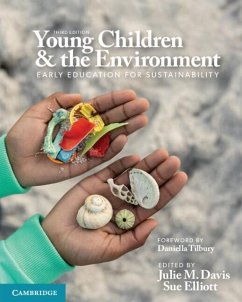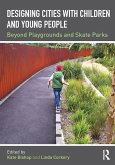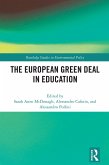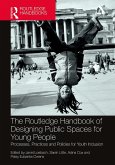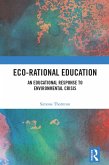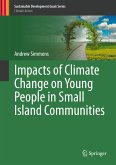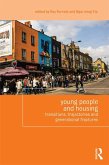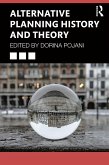Young Children and the Environment (eBook, PDF)
Early Education for Sustainability
Redaktion: Davis, Julie; Elliott, Sue
54,95 €
54,95 €
inkl. MwSt.
Sofort per Download lieferbar

27 °P sammeln
54,95 €
Als Download kaufen

54,95 €
inkl. MwSt.
Sofort per Download lieferbar

27 °P sammeln
Jetzt verschenken
Alle Infos zum eBook verschenken
54,95 €
inkl. MwSt.
Sofort per Download lieferbar
Alle Infos zum eBook verschenken

27 °P sammeln
Young Children and the Environment (eBook, PDF)
Early Education for Sustainability
Redaktion: Davis, Julie; Elliott, Sue
- Format: PDF
- Merkliste
- Auf die Merkliste
- Bewerten Bewerten
- Teilen
- Produkt teilen
- Produkterinnerung
- Produkterinnerung

Bitte loggen Sie sich zunächst in Ihr Kundenkonto ein oder registrieren Sie sich bei
bücher.de, um das eBook-Abo tolino select nutzen zu können.
Hier können Sie sich einloggen
Hier können Sie sich einloggen
Sie sind bereits eingeloggt. Klicken Sie auf 2. tolino select Abo, um fortzufahren.

Bitte loggen Sie sich zunächst in Ihr Kundenkonto ein oder registrieren Sie sich bei bücher.de, um das eBook-Abo tolino select nutzen zu können.
- Geräte: PC
- mit Kopierschutz
- eBook Hilfe
- Größe: 55.05MB
- FamilySharing(5)
Andere Kunden interessierten sich auch für
![Designing Cities with Children and Young People (eBook, PDF) Designing Cities with Children and Young People (eBook, PDF)]() Designing Cities with Children and Young People (eBook, PDF)48,95 €
Designing Cities with Children and Young People (eBook, PDF)48,95 €![The European Green Deal in Education (eBook, PDF) The European Green Deal in Education (eBook, PDF)]() The European Green Deal in Education (eBook, PDF)44,95 €
The European Green Deal in Education (eBook, PDF)44,95 €![The Routledge Handbook of Designing Public Spaces for Young People (eBook, PDF) The Routledge Handbook of Designing Public Spaces for Young People (eBook, PDF)]() The Routledge Handbook of Designing Public Spaces for Young People (eBook, PDF)46,95 €
The Routledge Handbook of Designing Public Spaces for Young People (eBook, PDF)46,95 €![Eco-Rational Education (eBook, PDF) Eco-Rational Education (eBook, PDF)]() Simone ThorntonEco-Rational Education (eBook, PDF)40,95 €
Simone ThorntonEco-Rational Education (eBook, PDF)40,95 €![Impacts of Climate Change on Young People in Small Island Communities (eBook, PDF) Impacts of Climate Change on Young People in Small Island Communities (eBook, PDF)]() Andrew SimmonsImpacts of Climate Change on Young People in Small Island Communities (eBook, PDF)73,95 €
Andrew SimmonsImpacts of Climate Change on Young People in Small Island Communities (eBook, PDF)73,95 €![Young People and Housing (eBook, PDF) Young People and Housing (eBook, PDF)]() Young People and Housing (eBook, PDF)52,95 €
Young People and Housing (eBook, PDF)52,95 €![Alternative Planning History and Theory (eBook, PDF) Alternative Planning History and Theory (eBook, PDF)]() Alternative Planning History and Theory (eBook, PDF)37,95 €
Alternative Planning History and Theory (eBook, PDF)37,95 €-
-
-
Produktdetails
- Verlag: Cambridge University Press
- Erscheinungstermin: 5. Januar 2024
- Englisch
- ISBN-13: 9781009488365
- Artikelnr.: 70910009
Dieser Download kann aus rechtlichen Gründen nur mit Rechnungsadresse in A, B, BG, CY, CZ, D, DK, EW, E, FIN, F, GR, HR, H, IRL, I, LT, L, LR, M, NL, PL, P, R, S, SLO, SK ausgeliefert werden.
- Herstellerkennzeichnung Die Herstellerinformationen sind derzeit nicht verfügbar.
Part I: 1. What is early childhood education for sustainability and why
does it matter? Julie M. Davis and Sue Elliott; 2. Exploring a
nature-sustainability nexus: Australian immersive nature play programs and
education for sustainability Fran Hughes and Sue Elliott; 3. Two worlds,
one culture: sustaining Dharawal cultural and language practices through
play Jodi Edwards; 4. Missing voices: children's understandings of
sustainability topics and the 4C pedagogical framework Dr Mia Christensen,
Lyndal O'Gorman, Kerryann Walsh and Julie M. Davis; 5. Listening to young
children with/in nature: relational, pedagogical, and community approaches
that work Ali Black and Lisa Ryan, with Okjong Ji; 6. Practical
possibilities and pedagogical approaches in early childhood education for
sustainability: Australian perspectives Sue Elliott, Samantha Millard, Lisa
Weidenbach, Yvonne Paujik, Linda Price and Rosanne Pugh; 7. Leadership and
advocacy through early childhood for sustainability in times of crisis
Wendy Boyd and Lisa Palethorpe; 8. Exploring the Sustainable Development
Goals: beyond the environmental dimension Lisa J. Sonter, Sharon Kemp,
Cherie Lamb and Stephanie Willey; 9. Harnessing children's interest in
digital technologies for sustainability learning: catalyst for conversation
Jo Bird and Melanie Pearson; 10. Healthy and sustainable environments for
children and communities in a changing climate Sue Cooke and Andrea
Baldwin; 11. Early learning for sustainability through STEAM Lyndal
O'Gorman and Mia Christensen; Part II: 12. How preschool education in
Sweden contributes to cultures for sustainability: rights and equity at the
core of early childhood education for sustainability Ingrid Engdahl, Ingrid
Pramling Samuelsson and Eva Ärlemalm-Hagsér; 13. Opportunities for early
childhood for sustainability in the Americas: engaging with sustainability
in early childhood teacher education Victoria Carr, Debra Harwood, Andrew
Bernier and Martin Bascopé; 14. Sustainability education in early childhood
education contexts: insights and alternate perspectives from India, Japan,
China and Singapore Sylvia Christine Almedia, Midori Mitsuhashi, Minyi Li,
G. Kaveri and Michiko Inoue; 15. Building knowledge and competence to
promote sustainability in early childhood education: four European
perspectives Eva Ärlemalm-Hagsér, Diane Boyd, Naomi McLeod, Maria Assunção
Folque and Dr Deniz Kahriman; 16. Using systems thinking to mainstream
early childhood education for sustainability Julie M. Davis and Sue
Elliott, with Nadine McCrea, Glynne Mackey and Sule Alici.
does it matter? Julie M. Davis and Sue Elliott; 2. Exploring a
nature-sustainability nexus: Australian immersive nature play programs and
education for sustainability Fran Hughes and Sue Elliott; 3. Two worlds,
one culture: sustaining Dharawal cultural and language practices through
play Jodi Edwards; 4. Missing voices: children's understandings of
sustainability topics and the 4C pedagogical framework Dr Mia Christensen,
Lyndal O'Gorman, Kerryann Walsh and Julie M. Davis; 5. Listening to young
children with/in nature: relational, pedagogical, and community approaches
that work Ali Black and Lisa Ryan, with Okjong Ji; 6. Practical
possibilities and pedagogical approaches in early childhood education for
sustainability: Australian perspectives Sue Elliott, Samantha Millard, Lisa
Weidenbach, Yvonne Paujik, Linda Price and Rosanne Pugh; 7. Leadership and
advocacy through early childhood for sustainability in times of crisis
Wendy Boyd and Lisa Palethorpe; 8. Exploring the Sustainable Development
Goals: beyond the environmental dimension Lisa J. Sonter, Sharon Kemp,
Cherie Lamb and Stephanie Willey; 9. Harnessing children's interest in
digital technologies for sustainability learning: catalyst for conversation
Jo Bird and Melanie Pearson; 10. Healthy and sustainable environments for
children and communities in a changing climate Sue Cooke and Andrea
Baldwin; 11. Early learning for sustainability through STEAM Lyndal
O'Gorman and Mia Christensen; Part II: 12. How preschool education in
Sweden contributes to cultures for sustainability: rights and equity at the
core of early childhood education for sustainability Ingrid Engdahl, Ingrid
Pramling Samuelsson and Eva Ärlemalm-Hagsér; 13. Opportunities for early
childhood for sustainability in the Americas: engaging with sustainability
in early childhood teacher education Victoria Carr, Debra Harwood, Andrew
Bernier and Martin Bascopé; 14. Sustainability education in early childhood
education contexts: insights and alternate perspectives from India, Japan,
China and Singapore Sylvia Christine Almedia, Midori Mitsuhashi, Minyi Li,
G. Kaveri and Michiko Inoue; 15. Building knowledge and competence to
promote sustainability in early childhood education: four European
perspectives Eva Ärlemalm-Hagsér, Diane Boyd, Naomi McLeod, Maria Assunção
Folque and Dr Deniz Kahriman; 16. Using systems thinking to mainstream
early childhood education for sustainability Julie M. Davis and Sue
Elliott, with Nadine McCrea, Glynne Mackey and Sule Alici.
Part I: 1. What is early childhood education for sustainability and why
does it matter? Julie M. Davis and Sue Elliott; 2. Exploring a
nature-sustainability nexus: Australian immersive nature play programs and
education for sustainability Fran Hughes and Sue Elliott; 3. Two worlds,
one culture: sustaining Dharawal cultural and language practices through
play Jodi Edwards; 4. Missing voices: children's understandings of
sustainability topics and the 4C pedagogical framework Dr Mia Christensen,
Lyndal O'Gorman, Kerryann Walsh and Julie M. Davis; 5. Listening to young
children with/in nature: relational, pedagogical, and community approaches
that work Ali Black and Lisa Ryan, with Okjong Ji; 6. Practical
possibilities and pedagogical approaches in early childhood education for
sustainability: Australian perspectives Sue Elliott, Samantha Millard, Lisa
Weidenbach, Yvonne Paujik, Linda Price and Rosanne Pugh; 7. Leadership and
advocacy through early childhood for sustainability in times of crisis
Wendy Boyd and Lisa Palethorpe; 8. Exploring the Sustainable Development
Goals: beyond the environmental dimension Lisa J. Sonter, Sharon Kemp,
Cherie Lamb and Stephanie Willey; 9. Harnessing children's interest in
digital technologies for sustainability learning: catalyst for conversation
Jo Bird and Melanie Pearson; 10. Healthy and sustainable environments for
children and communities in a changing climate Sue Cooke and Andrea
Baldwin; 11. Early learning for sustainability through STEAM Lyndal
O'Gorman and Mia Christensen; Part II: 12. How preschool education in
Sweden contributes to cultures for sustainability: rights and equity at the
core of early childhood education for sustainability Ingrid Engdahl, Ingrid
Pramling Samuelsson and Eva Ärlemalm-Hagsér; 13. Opportunities for early
childhood for sustainability in the Americas: engaging with sustainability
in early childhood teacher education Victoria Carr, Debra Harwood, Andrew
Bernier and Martin Bascopé; 14. Sustainability education in early childhood
education contexts: insights and alternate perspectives from India, Japan,
China and Singapore Sylvia Christine Almedia, Midori Mitsuhashi, Minyi Li,
G. Kaveri and Michiko Inoue; 15. Building knowledge and competence to
promote sustainability in early childhood education: four European
perspectives Eva Ärlemalm-Hagsér, Diane Boyd, Naomi McLeod, Maria Assunção
Folque and Dr Deniz Kahriman; 16. Using systems thinking to mainstream
early childhood education for sustainability Julie M. Davis and Sue
Elliott, with Nadine McCrea, Glynne Mackey and Sule Alici.
does it matter? Julie M. Davis and Sue Elliott; 2. Exploring a
nature-sustainability nexus: Australian immersive nature play programs and
education for sustainability Fran Hughes and Sue Elliott; 3. Two worlds,
one culture: sustaining Dharawal cultural and language practices through
play Jodi Edwards; 4. Missing voices: children's understandings of
sustainability topics and the 4C pedagogical framework Dr Mia Christensen,
Lyndal O'Gorman, Kerryann Walsh and Julie M. Davis; 5. Listening to young
children with/in nature: relational, pedagogical, and community approaches
that work Ali Black and Lisa Ryan, with Okjong Ji; 6. Practical
possibilities and pedagogical approaches in early childhood education for
sustainability: Australian perspectives Sue Elliott, Samantha Millard, Lisa
Weidenbach, Yvonne Paujik, Linda Price and Rosanne Pugh; 7. Leadership and
advocacy through early childhood for sustainability in times of crisis
Wendy Boyd and Lisa Palethorpe; 8. Exploring the Sustainable Development
Goals: beyond the environmental dimension Lisa J. Sonter, Sharon Kemp,
Cherie Lamb and Stephanie Willey; 9. Harnessing children's interest in
digital technologies for sustainability learning: catalyst for conversation
Jo Bird and Melanie Pearson; 10. Healthy and sustainable environments for
children and communities in a changing climate Sue Cooke and Andrea
Baldwin; 11. Early learning for sustainability through STEAM Lyndal
O'Gorman and Mia Christensen; Part II: 12. How preschool education in
Sweden contributes to cultures for sustainability: rights and equity at the
core of early childhood education for sustainability Ingrid Engdahl, Ingrid
Pramling Samuelsson and Eva Ärlemalm-Hagsér; 13. Opportunities for early
childhood for sustainability in the Americas: engaging with sustainability
in early childhood teacher education Victoria Carr, Debra Harwood, Andrew
Bernier and Martin Bascopé; 14. Sustainability education in early childhood
education contexts: insights and alternate perspectives from India, Japan,
China and Singapore Sylvia Christine Almedia, Midori Mitsuhashi, Minyi Li,
G. Kaveri and Michiko Inoue; 15. Building knowledge and competence to
promote sustainability in early childhood education: four European
perspectives Eva Ärlemalm-Hagsér, Diane Boyd, Naomi McLeod, Maria Assunção
Folque and Dr Deniz Kahriman; 16. Using systems thinking to mainstream
early childhood education for sustainability Julie M. Davis and Sue
Elliott, with Nadine McCrea, Glynne Mackey and Sule Alici.
